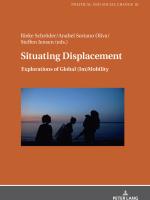Understanding Gendered Border Violence in Transit
In this new anthology, Chemlali argues that it is essential to explore the gendered dimensions to border violence, a specific form of violence inextricably linked to EU’s border migration politics. To further our understanding of migrant women as humanitarian subjects between simple dichotomies of ‘victims’ and ‘criminals’, she proposes to develop the concept of gendered border violence to capture how and to which extent border management is gendered.
Relating this to the larger issues in this volume, this approach helps us understand, in new ways, gendered processes of displacement, mobility and immobility. It suggests that the space and the time between displacement and whatever arrival possible are crucially gendered in the ways in which men and women’s lives can be lived.
This anthology offers a fresh look at the theme of forced mobility and displacement. By situating displacement and creating a dialogue with disciplines and analytical perspectives from other academic fields, we broaden the scope of thinking about displacement with different chapters taking well-established ideas from migration, mobility, and refugee research into the conversation. By situating displacement in new ways and from alternate angles, the anthology opens up new reflections, relevant across several disciplinary fields.
BOOK LAUNCH: ‘SITUATING DISPLACEMENT. EXPLORATIONS OF GLOBAL (IM)MOBILITY’
AALBORG UNIVERSITY COPENHAGEN
FREDERIKSKAJ 12 B
ROOM 0.06 (GROUND FLOOR)
2450 COPENHAGEN SOUTH WEST
DIIS Experts


